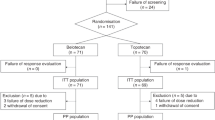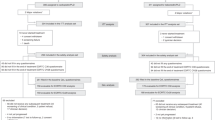Abstract
Purpose
Capecitabine is an oral chemotherapeutic agent, already used in breast and colon cancer. Previous data showed encouraging results in the treatment of recurrent ovarian cancer. The aim of this study was to describe activity and toxicity of capecitabine in patients with platinum resistant or refractory ovarian cancer.
Methods
Patients were eligible if they had cytologically or histologically proven epithelial ovarian cancer, refractory or resistant to prior platinum-containing chemotherapy. Capecitabine was administered at the dose of 1,250 mg/m2 twice daily on days 1–14 of a 21-day cycle for a maximum of six cycles. The primary end point of the study was activity in terms of objective response rate in according to RECIST criteria. A two-stage minimax design for phase II studies was used: at least four objective responses had to be reached among 32 evaluable patients to define the treatment active.
Results
Between March 2006 and October 2007, 36 patients were enrolled. All patients had ovarian cancer and 83.3% had previously received two or three lines of chemotherapy. Thirty-two patients were evaluable for response and included in the activity analysis. The objective response rate was 3.1% [95% exact confidence interval (CI): 0.08–16.22%], lower than the threshold required to define the treatment as active. The median progression free survival was 68 days (95% CI: 65–120). Haematological toxicity was not frequent. Nausea and fatigue were common, but never severe, and they were observed in 13 (37.1%) and 12 (34.2%) patients, respectively. Diarrhoea occurred in 11 patients (31.5%) and it was of grade 3 in 8.6% of cases. Grade 1–2 stomatitis was observed in seven patients (20%). Cardiovascular toxicity was reported in two cases, including a death for pulmonary embolism.
Conclusions
Capecitabine is not active in platinum resistant non mucinous ovarian cancer, producing a response rate lower than that required by study design. Further trials are not warranted in these patients.


Similar content being viewed by others
References
Neijt JP, Engelholm SA, Tuxen MK, Sorensen PG, Hansen M, Sessa C, de Swart CAM, Hirsch FR, Lund B, van Houweligen HC (2000) Exploratory phase III study of paclitaxel and cisplatin versus paclitaxel and carboplatin in advanced ovarian cancer. J Clin Oncol 18:3084–3092
du Bois A, Luck H-J, Meier W, Adams H-P, Mobus V, Costa S, Bauknecht T, Richter B, Warm M, Schroder W, Olbricht S, Nitz U, Jaskisch C, Emons G, Wagner U, Kuhn W, Pfisterer J, for the Arbeitsgemeinschaft Gynakologische Onkologie (AGO) Ovarian Cancer Study Group (2003) A randomized clinical trial of cisplatin/paclitaxel versus carboplatin/paclitaxel as first-line treatment of ovarian cancer. J Natl Cancer Inst 95:1320–1330
du Bois A, Quinn M, Thigpen T et al, Gynecologic Cancer Intergroup, AGO-OVAR, ANZGOG, EORTC, GEICO, GINECO, GOG, JGOG, MRC/NCRI, NCIC-CTG, NCI-US, NSGO, RTOG, SGCTG, IGCS, Organizational Team of the two prior International OCCC (2005) 2004 Consensus statements on the management of ovarian cancer: final document of the third international gynecologic cancer intergroup ovarian cancer consensus conference (GCIG OCCC 2004). Ann Oncol 16(Suppl 8):viii7–viii12
Markman M, Reichman B, Hakes T et al (1991) Responses to second-line cisplatin based intraperitoneal therapy in ovarian cancer: influence of a prior response to intravenous cisplatin. J Clin Oncol 9:1801–1805
Herzog TJ (2004) Recurrent ovarian cancer: how important is it to treat to disease progression? Clin Cancer Res 10:7439–7449
Vermorken JB, Harper PG, Buyse M (1999) The role of anthracyclines in epithelial ovarian cancer. Ann Oncol 10(suppl 1):43–50
Rose PG, Blessing JA, Mayer AR et al (1998) Prolonged oral etoposide as second-line therapy for platinum-resistant and platinum-sensitive ovarian carcinoma: a Gynecologic Oncology Group study. J Clin Oncol 16:405–410
l Huinink W, Gore M, Carmichael J et al (1995) Topotecan versus paclitaxel for the treatment of recurrent epithelial ovarian cancer. J Clin Oncol 15:2183–2193
Gordon AN, Fleagle JT, Guthrie D et al (2001) Recurrent epithelial ovarian carcinoma: a randomized phase III study of pegylated liposomal doxorubicin versus topotecan. J Clin Oncol 19(14):3312–3322
Lund B, Hansen OP, Theilade K et al (1994) Phase II study of gemcitabine (2′,2′-difluorodeoxycytidine) in previously treated ovarian cancer patients. J Natl Cancer Inst 86:1530–1533
Look KY, Blessing JA, Muss HB (1992) 5-Fluorouracil and low dose leucovorin in the treatment of recurrent epithelial ovarian carcinoma: a phase II trial of the Gynecologic Oncology Group. Am J Clin Oncol 15:494–496
Look KY, Muss HB, Blessing JA (1995) 5-Fluorouracil and high dose leucovorin in the treatment of recurrent epithelial ovarian carcinoma: a phase II trial of the Gynecologic Oncology Group. Am J Clin Oncol 18:19–22
Miwa M, Ura M, Nishida M et al (1998) Design of a novel oral fluoropyrimidine carbamate, capecitabine, which generates 5-fluorouracil selectively in tumours by enzymes concentrated in human liver and cancer tissue. Eur J Cancer 34:1274–1281
Koukourakis GV, Kouloulias V, Koukourakis MJ et al (2008) Efficacy of the oral fluorouracil pro-drug capecitabine in cancer treatment: a review. Molecules 13(8):1897–1922
Ershler WB (2006) Capecitabine monotherapy: safe and effective treatment for metastatic breast cancer. Oncologist 11:325–335
Walko CM, lindley C (2005) Capecitabine: a review. Clin Ther 27:23–44
Vasey PA, McMahon L, Paul J, Reed N, Kaye SB (2003) A phase II trial of capecitabine (xeloda in recurrent ovarian cancer. Br J Cancer 89:1843–1848
Rischin D, Phillips KA, Friedlander M, Harnett P, Quinn M, Richardson G, Martin A (2004) A phase II trial of capecitabine in heavily pre-treated platinum resistant ovarian cancer. Gynecol Oncol 93:417–421
Garcia AA, Blessing JA, Lenz HJ, Darcy KM, Mannel RS, Miller DS et al (2005) Phase II clinical trial of capecitabine in ovarian carcinoma recurrent 6–12 months after completion of primary chemotherapy, with exploratory TS, DPD, and TP correlates: a Gyncecologic Oncology Group study. Gynecol Oncol 96:810–817
Therasse P, Arbuck SG, Eisenhauer EA, Wanders J, Rubinstein RSKL, Verweij J, Van Glabbeke M, van Oosterom T, Christian MC, Gwyther SG (2000) New guidelines to evaluate the response to treatment in solid tumors. J Natl Cancer Inst 92:205–216
Cancer Therapy Evaluation Program (2006) Common Terminology Criteria for Adverse Events, Version 3.0, DCTD, NCI, NIH, DHHS March 31, 2003. http://ctep.cancer.gov
Kaplan EL, Meier P (1958) Non parametric estimation from incomplete observation. J Am Stat Assoc 53:457–481
Ch Bohemer, Jaeger W (2002) Capecitabine in the treatment of platinum-resistant recurrent ovarian cancer. Anticancer Res 22:439–443
Wolf JK, Bodurka DC, Verschraegen C, Sun CC, Branhamn D, Jenkins AD, Atkinson N, Gershenon DM (2006) A phase II trial of oral capecitabine in patients with platinum and taxane refractory ovarian, fallopian tube or peritoneal carcinoma. Gynecol Oncol 102:468–474
Acknowledgments
Partially supported by AIRC. The Authors thank Alfonso Savio for informatic assistance. Roche supported the study giving capecitabine at no cost and a research grant, without any right of property of data nor any influence on protocol planning, study conduction, analysis and interpretation.
Conflict of interest statement
No conflict of interest declared by the authors.
Author information
Authors and Affiliations
Corresponding author
Appendix
Appendix
Participating Institutions and other coauthors
Rights and permissions
About this article
Cite this article
Pisano, C., Morabito, A., Sorio, R. et al. A phase II study of capecitabine in the treatment of ovarian cancer resistant or refractory to platinum therapy: a multicentre Italian trial in ovarian cancer (MITO-6) trial. Cancer Chemother Pharmacol 64, 1021–1027 (2009). https://doi.org/10.1007/s00280-009-0958-0
Received:
Accepted:
Published:
Issue Date:
DOI: https://doi.org/10.1007/s00280-009-0958-0




